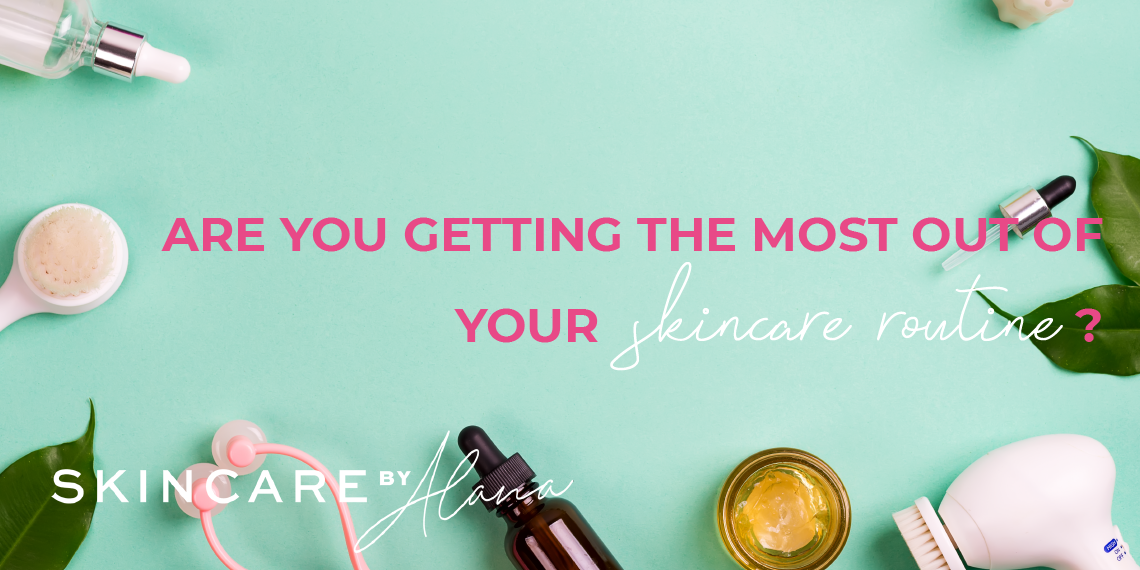
[ad_1]

At Skincare by Alana, we’re all about maximizing the results of your skincare routine.
Without proper knowledge of the active ingredients in your product lineup, you could be missing out on potential skincare synergies.
Or worse – a bad mixture could cause irritation and reverse the intended effects of the products.
Maybe your new quarantine ritual has included watching GRWM (“get ready with me”) videos on Youtube or browsing Pinterest for at-home masks and natural skincare products to up your skincare game.
The #SkincareRoutine hashtag has been used over 10 million times already, each with a unique combination of cleansers, serums, peels, and moisturizers – that’s 10 million potentially different recommendations!
It can be tempting to want to adopt a “little bit of this, little bit of that” to combine different skincare products, but the results don’t always maximize your benefits.
Now that you have a grocery list of skincare product recommendations to choose from, it’s time to take a crash course in “Skincare Mixology 101” to learn what skincare combos you should avoid.
We’ll break it down by the top trending skincare ingredients and take a look at what works with them, and what doesn’t.
PS – we’ve done all the research for you!
Read through our article for winning skincare product recommendations.
Retinol
First, let’s talk about Retinol.
Retinol, also known as Vitamin A, works by boosting the production of elastin and collagen in the dermis while gently exfoliating the outer layer of the skin.
When used appropriately, it can do wonders for tackling fine lines, wrinkles, evening skin tone, and soothing rosacea.
Retinol is powerful on its own, but it can be too much of a good thing.
Retinol has a number of amazing benefits for many different skin types – but it’s not right for everyone.
Before you decide to incorporate retinol into your skincare routine, check out our blog or take our quiz to see if retinol is right for you!

What to Avoid with Retinol
Acne Products with Benzoyl Peroxide & Salicylic Acid
Both benzoyl peroxide and salicylic acid are powerful acne-fighting ingredients.
Salicylic acid is used to unclog pores and treat acne whereas benzoyl peroxide eliminates acne-causing bacteria in the skin.
However, when either are used with retinol, the ingredients cancel each other out and eliminate all the benefits.
Retinol on it’s own can unclog pores and help fight acne so if you’re already using a retinoid in your routine, consider dropping other acne-fighting products that contain Benzoyl Peroxide & Salicylic Acid and let the retinol work its magic!
AHA’s (Alpha Hydroxy Acids)
AHA’s are exfoliating acids that can work wonders when paired with moisturizers but without, they can dry out your skin.
Retinol, when used in excess or on already moderate to dry skin, can also cause dryness or irritation.
Instead of layering on potentially drying ingredients, it’s best to skip products containing AHA’s and instead reach for products that replenish and hydrate your skin. (more on that below!)
Vitamin C
Vitamin C is great for protecting your skin, but the pH levels required to activate vitamin C just do not work with retinol.
When these two ingredients are used together, they can cancel each other out or cause irritation.
On days where you use retinol, it’s best to leave the vitamin C for fruit juice and not on your skin.
Retinol + Impatience
The waiting game can be excruciating, we know.
But in order to get the full benefits of this superpower product, it’s best not to rush into things.
Test retinol on a small part of your skin, avoiding the delicate skin around your eyes, to see how it reacts.
Try spacing it out over a few times a week rather than every day when you first start out.
Otherwise, your skin may become overloaded and react with irritation, redness, or peeling.
Take it slow and thank retinol later!

What Works with Retinol
Hyaluronic Acid
We mentioned that retinols can dry out the skin, so to make a winning combo, skip the AHAs and head for the hyaluronic acid.
Hyaluronic acid is a deeply penetrating moisturizer that can balance out any of the drying effects of retinol.
Because hyaluronic acid is naturally occurring in the body, with 50% of it concentrated in your skin, it helps to restore moisture for all skin types.
It’s the dream team!
Vitamin C
Vitamin C is a skincare superstar.
It’s a powerful antioxidant that helps to repair skin cells and prevent damage from UV rays and air pollution while brightening and toning.
Not only that, but Vitamin C can also help fight and repair damage caused by free radicals.
A quick aside so you can understand the true benefit Vitamin C has for your skin – let’s talk about free radicals.
You may have seen this phrase bouncing around in the descriptions of skincare products but if you’re still not 100% sure of what it means, here it is in a nutshell.
Free radicals are unstable molecules that are found in our external environment including the air, water, food, medicine, you name it.
Their instability means that they are constantly trying to bond with other atoms and molecules, including those in our bodies, causing the skin unnecessary oxidative stress.
What does this mean for your skin?
Free radicals can deteriorate the skin and speed up the aging process.
Basically, they’re exactly what you don’t want.
So when Vitamin C was shown to repair free radical damage, we were all over it.
Vitamin C is often incorporated into creams and toners but is most effective as a serum.
Vitamin C comes in many concentrations and derivatives, but looking out for “ascorbic acid” in the ingredients list is a good way to spot it.
The only trouble is that Vitamin C doesn’t always mix well with other ingredients.
What to Avoid with Vitamin C
Niacinamide AKA Vitamin B3
Niacinamide is another brightening vitamin that’s found in a variety of products.
The Vitamin C + Vitamin B3 combo is tricky but doable.
If you’re using both ingredients, you’ll want to leave at least 30 minutes in between applications to allow your skin’s pH balance to normalize.
Without this little breather, the ingredients will cancel each other out and you won’t reap the benefits of either of these awesome vitamins.
AHAs
Similar to when AHAs are used with retinol, this mixture can dry out and irritate the skin when used in tandem with vitamin C.
Together, these ingredients are either too exfoliating and can cause flaking and peeling or the acids will destabilize each other and you won’t see any effects.
Either way, it’s best to pass on the AHAs!
What Works with Vitamin C
Hyaluronic Acid
Hyaluronic acid also makes a great companion to vitamin C!
Studies have found that using hyaluronic acid for just 8 weeks can significantly improve skin’s texture, moisture, and firmness.
Check out our blog for 26 benefits that come just from using hyaluronic acid.
Plus it plays well with vitamin c’s delicate pH balance and helps to lock in moisture!
Vitamin E
Keep the vitamins coming!
Both vitamins A & E hail from the same antioxidant family and fight against UV damage, keeping your skin fresh and radiant.
Who doesn’t want that?
You’ll often find products that have both vitamins A and E in one, so make sure to read the ingredients label closely.
Ferulic Acid
Ferulic acid is another antioxidant found primarily in plants like oats, corn, and eggplant.
It is a powerful anti-aging ingredient that has been found to boost the effectiveness of vitamin C – we could all use a sidekick like that!

Winning Product Combinations
This Full Spectrum Hemp Retinol Oil is perfect on its own!
It’s infused with hemp and rosehip seed oil to gently moisturize your skin overnight so you can wake up to a fresh, glowing, bright face the next morning.
If you’ve already used retinol in the past and are looking for a powerful, buildable formula, Rhonda Allison’s Retinol Supreme is for you.
Just pair it with our Hyaluronic Moisture Boost Serum to seal in moisture and leave your skin looking healthy and hydrated.
If you’re looking for a daily Vitamin C moisturizer, then look no further – this Vitamin C moisturizer is light enough to use every day and includes hemp oil to lock in moisture.
Not into hemp? No worries.
This Cosmedica Skincare Duo comes with a prepping Vitamin C toner to wick away dirt, oil, and free radicals and a Hyaluronic Acid Serum to lock in moisture.
This duo is perfect for those new to skincare – try it out while it’s still on sale!
In need of some serious skin hydration?
This Derma E Vitamin E Cream deeply hydrates the face and body and repairs UV damage without leaving a heavy residue.
Pair it with Vitamin C oil for some extra antioxidant love.
This 2-in-1 Vitamin C & Ferulic Acid Serum uses emblica extract, a fruit that’s high in antioxidants, to fight off free radicals and improve the elasticity, clarity, and texture of your skin.
The Bottom Line
We know that everybody has their “secret formula” to skincare and the industry is changing all the time.
One person may swear by their retinol, and another may be in love with their Vitamin C routine.
While it may seem like a good idea to get the best of both worlds by using both types of products, you may actually be doing more harm than good or neutralizing the ingredients.
The skin is extremely absorbent so in most cases, if you give your skin enough breathing room between applications, you can use products that would otherwise react poorly when applied one on top of each other.
In any case, it’s just a matter of time and paying close attention to your skin to see how it reacts.
Just like pairing wine with dinner, you need to have a good understanding of the dish and its ingredients in order to find the perfect bottle of wine that will make all the flavors sing.
What it all boils down to is a lot of research and a little bit of experimentation to find a skincare ensemble that works for you.
Need help finding where to start?
Take our quick and easy skincare quiz to get personalized recommendations from a licensed esthetician that will send you down the road to perfect, healthy, happy skin.
[ad_2]






